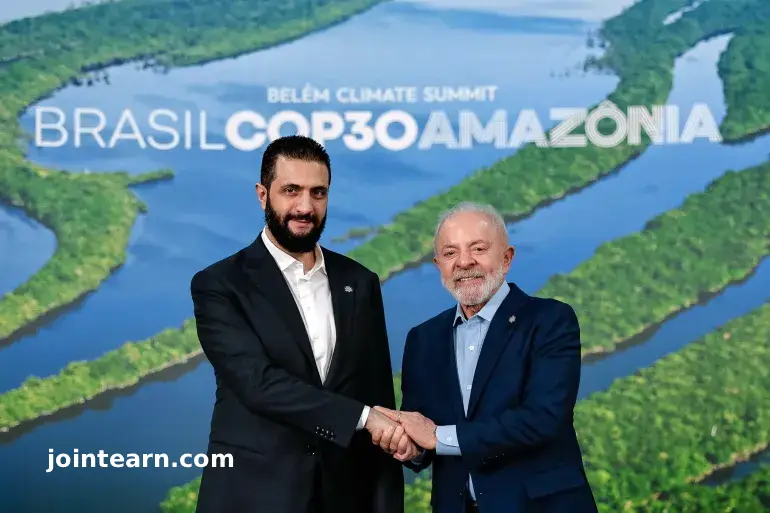
Syria’s Return to Global Stage Marked by COP30 Appearance
In a striking symbol of Syria’s reemergence on the world stage, President Ahmed al-Sharaa pledged full support for global climate goals during his speech at the United Nations COP30 Climate Summit in Belem, Brazil.
The Syrian leader’s participation at the Amazon-hosted event came just one day after the UN Security Council voted to lift long-standing sanctions against his administration — a major step in ending more than a decade of international isolation.
Al-Sharaa’s appearance also precedes a scheduled meeting with U.S. President Donald Trump in Washington, signaling a potential thaw in diplomatic relations between the two nations.
Al-Sharaa Calls for Global Climate Cooperation and Green Investment
Addressing delegates at COP30 on Thursday, President al-Sharaa underscored Syria’s commitment to the Paris Agreement and its willingness to collaborate with global partners on climate adaptation, water security, and renewable energy.
“We invite the world to invest in Syria’s green future — from solar fields in Homs to wind corridors along the Euphrates,” al-Sharaa said, describing his country’s post-war recovery as “an opportunity to rebuild sustainably.”
The president also highlighted the severe impact of climate change on Syria, where rising temperatures and drought conditions have devastated agriculture and water supplies.
“This year, we endured a drought unlike any in six decades,” he warned. “Climate action is not a choice — it is a necessity for survival.”
A New Chapter After Years of Conflict
Al-Sharaa’s remarks mark a dramatic turn for Syria, a nation long excluded from high-level international forums during the rule of former President Bashar al-Assad, who was overthrown in December 2024 after 14 years of civil war.
Once a commander in the opposition faction Hayat Tahrir al-Sham (HTS), al-Sharaa led a lightning offensive that captured Damascus in just 12 days, effectively ending the Assad family’s 53-year dynasty.
Since taking office, al-Sharaa has sought to distance his government from the militancy of its past and rebrand Syria as a partner in global peace and climate resilience.
UN Lifts Sanctions, Signaling a Path Toward Normalization
In a closely watched session on Thursday, the UN Security Council voted to remove financial and travel sanctions against al-Sharaa and Interior Minister Anas Khattab.
The U.S. sponsored the resolution, calling it “a necessary step to facilitate Syria’s reintegration into global institutions.”
While sanctions had already been temporarily waived for international visits, the formal repeal ends restrictions on arms imports, financial assets, and trade partnerships, opening the door to foreign investment and reconstruction assistance.
“This is a milestone moment,” said UN Special Envoy Tom Barrack, noting that Syria is also expected to join the U.S.-led coalition against ISIL (ISIS) — a move he described as “remarkable” given the country’s past isolation.
Symbolic Meeting With Brazil’s President Lula da Silva
During his stay in Brazil, al-Sharaa held bilateral talks with President Luiz Inácio Lula da Silva, focusing on renewable energy cooperation, Amazon protection, and knowledge sharing between developing nations.
Photos released by Brazil’s presidential office showed the two leaders smiling and shaking hands in a gesture of renewed South-South solidarity.
“From the Amazon to the Barada and Euphrates rivers, let us strengthen bonds of cooperation,” al-Sharaa said, invoking the symbolism of shared responsibility between the Global South’s major ecosystems.
Trump and Al-Sharaa to Meet in Washington
Following COP30, al-Sharaa is expected to travel to Washington, D.C., for high-level discussions with U.S. President Donald Trump.
The White House confirmed the visit but did not disclose the agenda.
Analysts expect talks to cover regional security, counterterrorism cooperation, and economic normalization, alongside limited discussion of environmental issues.
Trump notably skipped COP30 and has repeatedly called climate change “the greatest con job in history.”
Despite that stance, the U.S. vote to lift sanctions on Syria hints at a strategic rapprochement designed to counterbalance Iranian and Russian influence in the Levant.
Rebuilding Syria Through Green Diplomacy
The al-Sharaa government has positioned climate action as a pillar of Syria’s reconstruction strategy.
Officials from the Ministry of Environment and Natural Resources say the country plans to:
- Launch solar energy zones across Aleppo and Hama.
- Restore wetlands near the Orontes River for water conservation.
- Create a national drought resilience fund in partnership with the UN Development Programme.
Syria’s participation in COP30 marks the first time in nearly 15 years that it has taken a central role in international climate negotiations — a sign that its global reintegration may be accelerating.
Analysts: ‘Green Diplomacy Is Syria’s Way Back to the World’
Political observers say al-Sharaa’s climate diplomacy is more than symbolic. It represents a calculated effort to rebuild credibility and attract foreign aid under the banner of environmental cooperation.
“For al-Sharaa, climate policy is foreign policy,” said Dr. Lina Haddad, a Middle East political analyst based in Amman. “He is using green diplomacy to reopen channels of trade, recognition, and investment that were frozen for over a decade.”
Conclusion: From Isolation to Integration
Syria’s participation in COP30 underscores a broader transformation — from a sanctioned state scarred by conflict to one seeking partnership in global sustainability efforts.
While deep political wounds remain, the lifting of UN sanctions, improving ties with the U.S., and commitment to renewable energy all signal a new phase in Syria’s international comeback.
Whether al-Sharaa can balance the country’s fragile recovery with ambitious climate promises remains to be seen — but his COP30 appearance shows that Damascus is once again part of the global conversation.


Leave a Reply